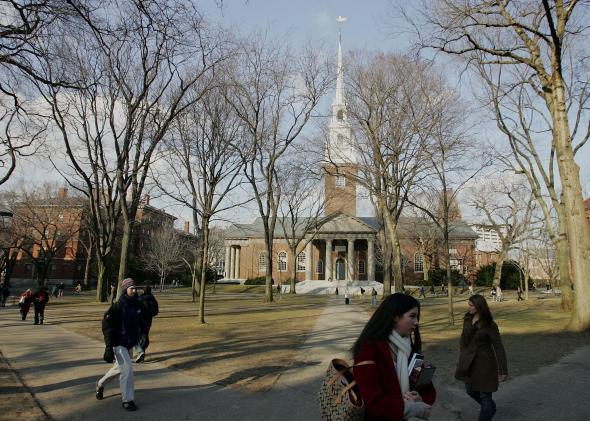John Paulson, the billionaire hedge-fund manager who made money hand-over-fist by betting against the subprime mortgage market before the housing bust, has decided to donate $400 million to Harvard University, where he attended business school. It is the largest gift in the institution’s history, beating out last year’s $350 million contribution by Gerald Chan, a Hong Kong developer and Harvard alum. According to the Wall Street Journal, the “money will be used to endow the School of Engineering and Applied Sciences, which will be renamed after Mr. Paulson.”
There are lots of reasons to groan about outsized philanthropic gestures to Ivy League schools, which inevitably have as much to do with the giver’s ego as their sense of altruism. (If you slap your name on a college campus in return for a pile of cash, your act of charity is, by definition, not very modest.) Harvard is already America’s richest university, with an endowment of $36 billion. That allows it to do lovely things like offer free rides to undergrads whose parents earn less than $65,000 per year. But by any reasonable measure, the school does not strictly need more money, especially compared to the financially strapped colleges that typically educate lower-income students.
And yet, Harvard and its elite peers are by far the biggest beneficiaries of the world’s giving. According to Moody’s, the 40 wealthiest colleges and universities suck up 59 percent of all charitable support devoted to higher ed. Last year, when U.S. colleges received $38 billion worth of contributions, according to the Council for Aid to Education, Harvard alone claimed $1.1 billion, or about 3 percent, of that total.
So Paulson is helping to exacerbate the severe and growing gap between schools that teach predominantly well off students and schools that teach the rest of America. Of course, his gift isn’t all bad. If you think about it as an investment in future research into areas like robotics and nanotechnology, where Harvard engineering professors have already made large strides, it even looks a bit forward-thinking. But it also feels a bit self-interested, and there are almost certainly more pressing causes in the world. The same can be said of Paulson’s last headline-grabbing donation—a $100 million gift to the nonprofit charged with preserving and tending to New York’s Central Park. The park is a public treasure that needs to be cared for. But just like many of the residences of the city’s millionaires and billionaires, Paulson’s own apartment just happens to overlook it.
In meantime, the man will presumably write this latest mega-donation off from his taxes, meaning the American public will effectively subsidize his act of personal monument-building. Which is the sort of thing that makes some people, including the Obama administration, believe we ought to limit charitable deductions.
If that ever happened, however, my guess it sadly would have the opposite of its intended effect. Billionaires motivated by vanity would continue making high-profile gifts to their alma maters and concert halls. Workaday wealthy families would keep giving to their churches and to their old colleges to make sure their kids get legacy treatment at admissions time. Meanwhile, unglamorous organizations that help the poor, which already receive at most about one third of all charitable giving, would likely suffer. If we want to support any worthwhile charitable giving through the tax code in this country, we probably also have to stomach supporting Paulson’s style of munificence.
